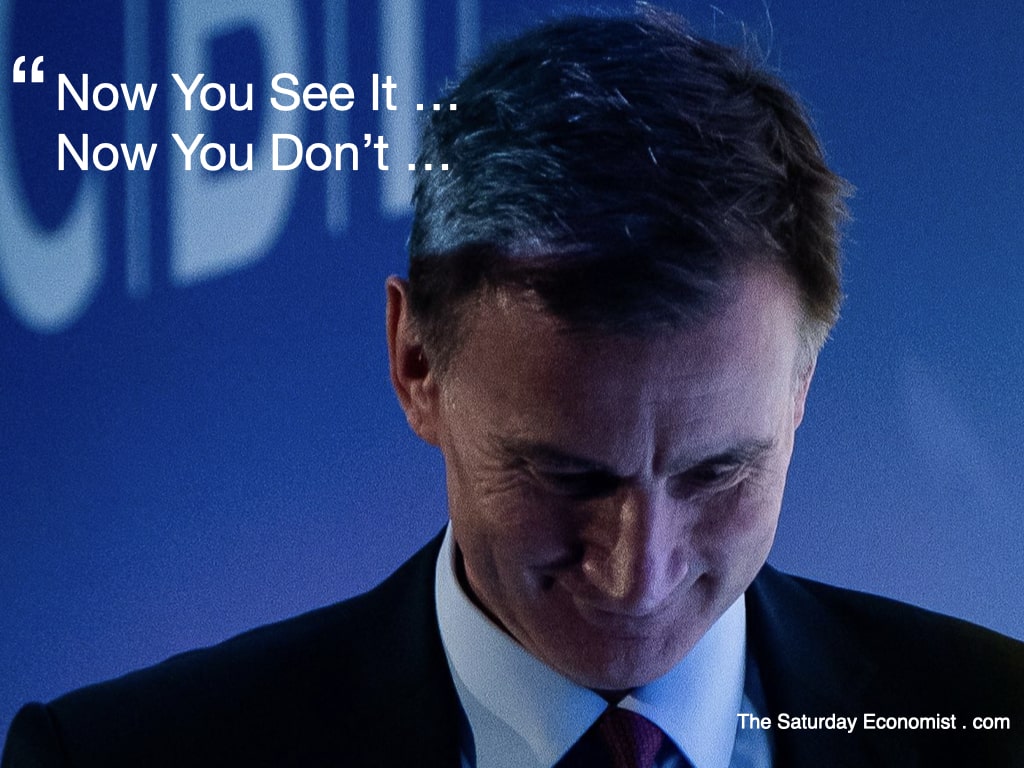|
Good news for the Chancellor last week. The government borrowed £35 billion less than expected in the first nine months of the financial year. The chancellor, it was said, is estimated to have, between £15 billion and £20 billion to spend on his budget in March. What a stroke of luck!
Or was it? This week, in a note to self Jeremy Hunt has admitted there is no more money after all. The chancellor, has said there will be less room for tax cuts in the spring budget next month. This, just days after the International Monetary Fund warned that the UK needed to focus on repairing public finances and a week after the OBR dismissed the Treasury spending forecasts as a work of fiction. (The week in which we also warned of the Bond Market Vigilantes). Hunt, who in November announced he was cutting the main rate of national insurance contributions, was widely believed to be gearing up for another tax giveaway after dropping a series of hints about what could be the Conservatives' last budget before a general election. However, the chancellor said he needed to manage expectations. "It doesn't look to me like we will have the same scope for cutting taxes in the spring budget that we had in the autumn statement," Hunt told the BBC's Political Thinking with Nick Robinson podcast. "I need to set people's expectations about the scale of what I'm doing, because people need to know that when a Conservative government cuts taxes, we will do so in a responsible and sensible way." His comments come days after the IMF issued a strong warning to the chancellor against cutting taxes in his March budget, noting that any tax giveaways would probably require extra borrowing or post-election spending cuts. The International Monetary Fund warned against pre-election tax cuts as it downgraded Britain's growth prospects. It said the country should instead curb borrowing and prioritize public spending in areas such as health and education "Preserving high quality public services will imply higher spending needs over the medium term than are currently reflected in the government's budget plans. Accommodating these needs while assuredly stabilizing the Debt to GDP ratio will already require generating additional high quality fiscal savings, including on the tax side". It is this context, that IMF staff advises against additional tax cuts. This follows the statements last week from Richard Hughes, Chairman of the OBR in front of the Treasury Select Committee. The Chairman of the Office for Budget Responsibility (OBR) essentially called the government's post 2025 plans, or the conspicuous lack thereof, a flight of fiscal fantasy. In a striking attack on the government Hughes, said ministers were not being honest with voters about the probable scale of public sector cuts because they had failed to publish detailed spending plans for the period after April 2025. "Beyond 2025 we know virtually nothing," Hughes told the Lords economic affairs committee. "It is just two numbers one for total current spending and one for total capital spending. I think some people have referred to that as a work of fiction. I think that's probably generous, given that someone has bothered to write a work of fiction whereas the government hasn't even bothered to write down what its spending plans are." So we say again, it is all a bit rum. In the space of a few weeks in the autumn, the Treasury, moved from a position in which the Chancellor had no money to play with, to one where he could announce some crowd pleasers because of the effect of higher inflation on tax revenues. Last week, it seems the Treasury moved from a position in which the Chancellor had spent all the goodies in the Autumn statement, to one where he could provide more vote winners in the Spring budget. Now it seems in a note to self, there is no more money for vote winners after all, pressure from the IMF and the OBR not withstanding. It's another episode of "Soap, Life In Downing Street". The intro to Soap, the U.S. Sitcom in the seventies,always began with an intro to the stories of the week and the summary "Confused you won't be after this week's episode". Or will you?
0 Comments
Leave a Reply. |
The Saturday EconomistAuthorJohn Ashcroft publishes the Saturday Economist. Join the mailing list for updates on the UK and World Economy. Archives
July 2024
Categories
All
|
| The Saturday Economist |
The material is based upon information which we consider to be reliable but we do not represent that it is accurate or complete and it should not be relied upon as such. We accept no liability for errors, or omissions of opinion or fact. In particular, no reliance should be placed on the comments on trends in financial markets. The presentation should not be construed as the giving of investment advice.
|
The Saturday Economist, weekly updates on the UK economy.
Sign Up Now! Stay Up To Date! | Privacy Policy | Terms and Conditions | |

 RSS Feed
RSS Feed